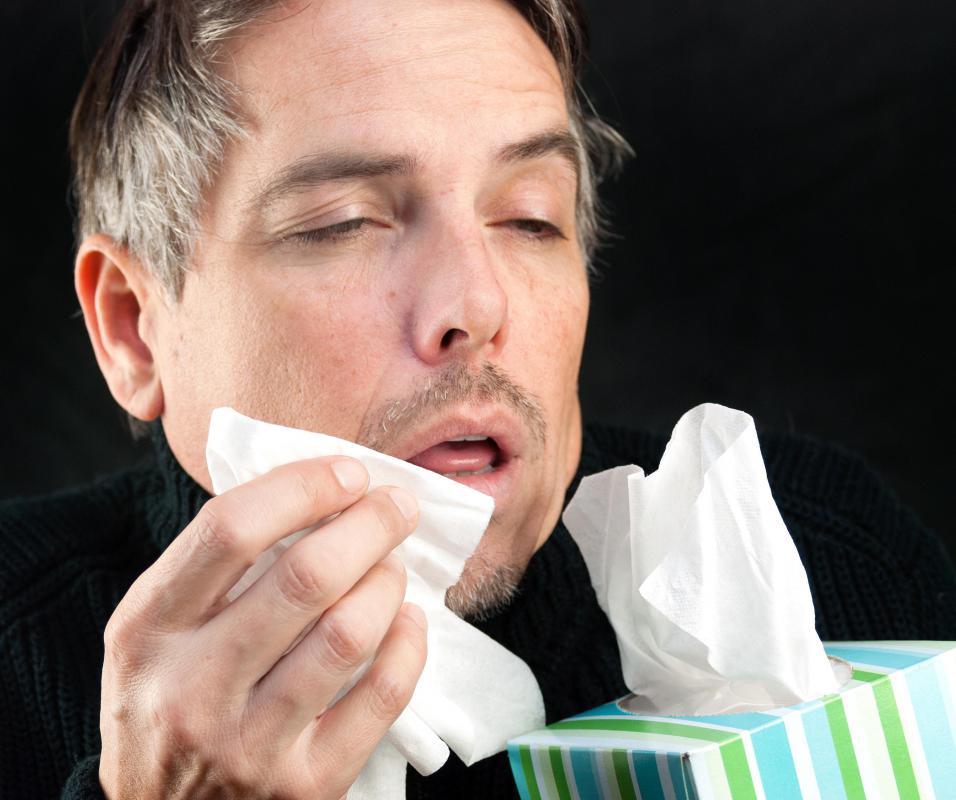At TheHealthBoard, we're committed to delivering accurate, trustworthy information. Our expert-authored content is rigorously fact-checked and sourced from credible authorities. Discover how we uphold the highest standards in providing you with reliable knowledge.
What is the Best Sinus Headache Relief?
The best options for sinus headache relief depend on what is causing the headache. Typically, pain from a sinus headache occurs in front of the face and head and can be severe. Frequently, throbbing pain is exacerbated when leaning forward or bending down. Sinus headaches are sometimes caused by infection, allergies or nasal polyps, which may cause an obstruction. Some relief options include prescription antibiotics, decongestants and anti-inflammatory medication. Sometimes sufferers can find natural relief with such treatments as breathing steam or taking eucalyptus oil.
Generally, if a sinus headache is caused by a bacterial sinus infection, antibiotics will commonly be prescribed. Usually, when the infection is resolved, the patient will experience relief from the headache. If a sinus infection is related to a viral infection, antibiotics will generally not be prescribed, as antibiotics are ineffective in treating viruses. When taking antibiotics, the patient should be counseled to finish his complete course of medication to ensure complete resolution of infection.

Typically, oral decongestants are effective for sinus headache relief. Most often, sinus headaches are caused by inflammation of the sinus passages. When this occurs, the passages become blocked making it difficult for mucus to drain, causing pain and pressure. Normally, oral decongestants shrink swollen tissue in the nasal lining, decreasing pressure and providing relief from the sinus headache. Sometimes, oral decongestants may raise blood pressure, so the patient should speak with his doctor prior to taking them.

Another effective treatment for sinus headache relief is the use of nasal spray decongestants. Generally, these medications work similarly to oral decongestants, but relief is typically achieved faster. Nasal decongestant sprays shrink swollen nasal passages to reduce headache pain. Although this treatment is effective, nasal sprays may promote rebound congestion. This condition causes sinus passages to swell even more, so these decongestant sprays should not be used for more than three days, unless otherwise directed by a physician.

In addition to pharmacological intervention, relief from a sinus headache may also be obtained by natural methods, such as breathing in steam or using a humidifier. Swollen nasal passages may become dry and irritated, contributing to a sinus headache. Typically, humidified air reduces nasal dryness and soothes the sore lining of the sinus passages. Sometimes, taking eucalyptus oil supplements can reduce swollen sinuses and promote sinus headache relief. Using herbal and alternative remedies should be discussed with a physician.

Occasionally, when non-invasive treatments for sinus headache relief are ineffective, the physician may recommend surgery. Sometimes polyps and hypertrophied nasal tissue are responsible for sinus headaches and congestion. By surgically removing polyps and excess tissue from the lining, the patient can frequently achieve substantial relief from sinus headaches.
AS FEATURED ON:
AS FEATURED ON:



















Discussion Comments
Anyone who is thinking about trying a decongestant nasal spray should consult with his or her doctor first. A discussion about dealing with sinus congestion, and controlling headaches that accompany them, will help the patient plan for alternative treatments. This strategy will help prevent the urge to overuse nasal sprays which could result in dependency on them.
Post your comments